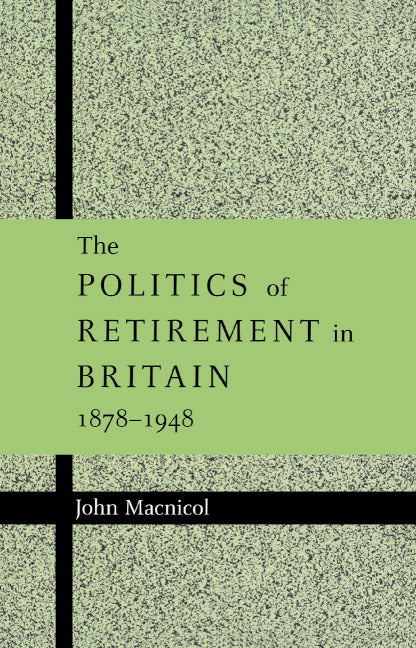Freshly Printed - allow 8 days lead
Couldn't load pickup availability
The Politics of Retirement in Britain, 1878–1948
A very important and thorough analysis of the debate on retirement and state pensions in Britain.
John Macnicol (Author)
9780521622738, Cambridge University Press
Hardback, published 13 August 1998
438 pages, 10 tables
22.9 x 15.2 x 2.9 cm, 0.81 kg
' … an excellent, meticulously researched account of the development of policy towards pensions from the early campaigns which resulted in old age pensions in 1908 through to the welfare state … an excellent book on a vitally important topic.' Parliamentary History
Based on much original research, this book examines in detail the emergence of retirement as a social issue in the period 1878 to 1948, focusing in particular on the evolution of state pensions. Important insights are offered into the role of key individuals, such as William Blackley, Joseph Chamberlain, and Charles Booth and interest groups, such as the Charity Organisation Society, the friendly societies, the labour movement and pensioners' organisations. Subsequent sections examine the shift to contributory pensions as part of the 'new Conservatism' of the 1920s, the debate on retirement pensions in the following decade, the treatment of old age poverty by the inter-war social surveys, and the concern over the 'burden' of an ageing population in the late 1930s. The book concludes with a radical reinterpretation of the 1942 Beveridge Report. This book promises to be the definitive history of state pensions in Britain.
Part I. The Campaign for Old Age Pensions: 1. Introduction
2. The nineteenth-century background
3. Blackley, Chamberlain and Booth
4. The opposition of the Charity Organisation Society
5. The attitude of the Friendly Societies
6. The Labour Movement and the State
Part II. Contributory Pensions: 7. The First World War and the 1919 Ryland Adkins committee
8. From 'all-in insurance' to contributory pensions
Labour's lost opportunity
9. Neville Chamberlain, the 'New Conservatism' and the 1925 Act
Part III. The Debate on Retirement Pensions: 10. Labour and retirement pensions in the late 1920s
11. PEP and retirement pensions in the 1930s: an ageing population
12. Poverty surveys
Part IV. The Beveridge 'Revolution': 13. The pensions crisis of the late 1930s
14. All-party pressure in the late 1930s: the Treasury enquiry and the 1940 Act
15. The origins and working of the Beveridge Committee
16. After the Beveridge report, 1942–8
17. Conclusion.
Subject Areas: 20th century history: c 1900 to c 2000 [HBLW], British & Irish history [HBJD1]


